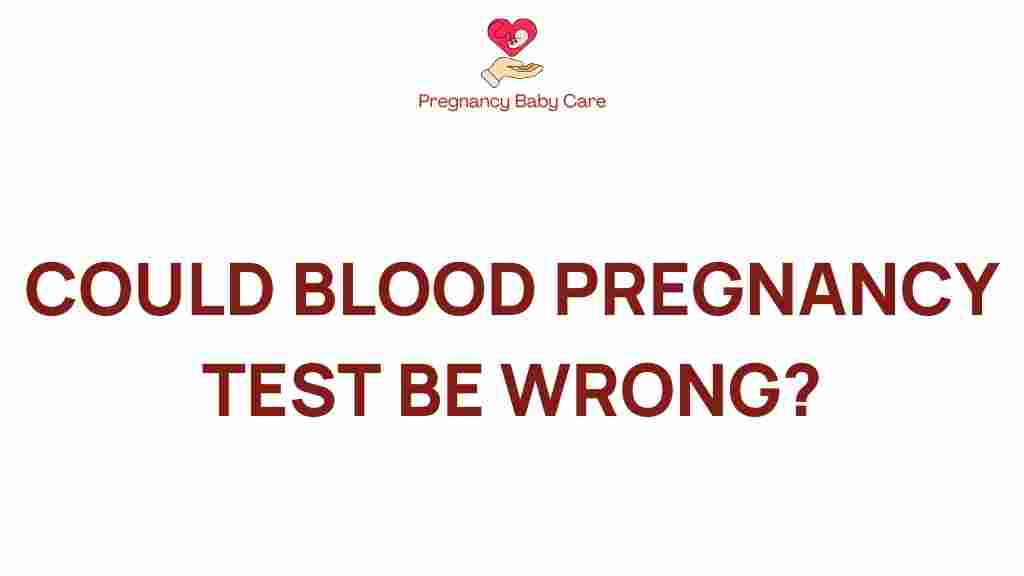The Surprising Truth: Can Blood Pregnancy Tests Be Incorrect?
When it comes to confirming a pregnancy, many women turn to blood pregnancy tests for their accuracy and reliability. But can these tests ever be incorrect? In this article, we will explore the accuracy of blood pregnancy tests, the potential for false negatives, and the factors that can influence the results. We’ll also discuss early detection, hormone levels, and the implications for women’s health. Let’s dive into the surprising truth about blood pregnancy tests!
Understanding Blood Pregnancy Tests
A blood pregnancy test is a method used to determine if you are pregnant by measuring the levels of human chorionic gonadotropin (hCG) in your bloodstream. This hormone is produced shortly after a fertilized egg attaches to the uterine lining. Blood tests are typically conducted in a medical setting and can detect lower levels of hCG compared to home urine tests. This makes them particularly useful for early pregnancy detection.
Types of Blood Pregnancy Tests
There are two main types of blood pregnancy tests:
- Qualitative hCG Test: This test simply checks for the presence of hCG in the blood. It provides a yes or no answer regarding pregnancy.
- Quantitative hCG Test: This test measures the exact amount of hCG in the blood. It can help determine how far along a pregnancy is and assess whether the pregnancy is progressing normally.
Factors Affecting the Accuracy of Blood Pregnancy Tests
The accuracy of a blood pregnancy test can be influenced by several factors, leading to potential false negatives or positives. Understanding these factors is crucial for women seeking pregnancy confirmation.
Timing of the Test
One of the most significant factors affecting the accuracy of blood pregnancy tests is timing. Testing too early can result in a false negative. hCG levels typically double every 48 to 72 hours after implantation, so testing before your missed period might not yield reliable results.
Hormone Levels
The levels of hCG can vary widely among individuals and even in different pregnancies. Factors such as:
- Individual hormone production
- Multiple pregnancies (twins or more can produce higher hCG levels)
- Certain medical conditions
can influence the test results. For example, some women may produce lower levels of hCG during early pregnancy, leading to a false negative result.
Testing Methods
The method used to conduct the blood pregnancy test can also impact accuracy. Laboratory errors, such as sample contamination or mishandling, can lead to incorrect results. It’s essential to have tests conducted in reputable medical facilities to minimize these risks.
Medications and Medical Conditions
Some medications, particularly those containing hCG, can cause false positives. Additionally, certain medical conditions, such as ectopic pregnancies or trophoblastic diseases, can lead to abnormal hCG levels, complicating the interpretation of results.
False Negatives: What to Know
A false negative occurs when a blood pregnancy test indicates that a woman is not pregnant when she actually is. This can be distressing and lead to confusion. Here are some common reasons for false negatives:
- Testing Too Early: As mentioned, testing before hCG levels are detectable can result in a false negative.
- Low hCG Levels: Variations in hormone levels may not be sufficient for detection.
- Improper Sample Handling: Errors in the laboratory can lead to inaccurate results.
- Misinterpretation of Results: Sometimes, the results can be misread or misunderstood, leading to a false belief that one is not pregnant.
Early Detection of Pregnancy
Blood pregnancy tests are particularly advantageous for early detection. If you suspect you might be pregnant but receive a negative result, consider waiting a few days and retesting. Early detection can help in planning and ensuring a healthy pregnancy.
Signs of Early Pregnancy
In addition to testing, be aware of the early signs of pregnancy, which can include:
- Missed period
- Morning sickness
- Fatigue
- Breast tenderness
- Frequent urination
If you experience these symptoms alongside a negative test, consult with your healthcare provider for further evaluation.
Health Risks and Women’s Health Considerations
Understanding the accuracy of blood pregnancy tests is essential for women’s health. Incorrect results can lead to delayed medical care or unplanned decisions regarding pregnancy. If you suspect a problem or have irregular symptoms, it’s vital to seek medical advice.
What To Do If You Get a False Negative
If you believe you have received a false negative result from a blood pregnancy test, consider the following steps:
- Wait a few days and retest, allowing hCG levels to rise if you are indeed pregnant.
- Consult with your healthcare provider for a follow-up test or additional testing methods.
- Keep track of your symptoms and any changes in your body.
Alternative Testing Methods
While blood tests are highly accurate, some women may prefer to use urine pregnancy tests at home. These tests are convenient and can also provide reliable results when used correctly. However, for the most accurate results, especially in early detection, a blood pregnancy test is recommended.
Conclusion
Blood pregnancy tests are generally accurate but can yield false negatives due to several factors. Timing, hormone levels, testing methods, and individual health can all play a role in the results. Understanding these elements is vital for women seeking pregnancy confirmation.
If you are unsure about your test results or experience unusual symptoms, do not hesitate to consult with your healthcare provider. Early detection and accurate testing are crucial for ensuring the health and well-being of both the mother and the baby.
For more information on women’s health and pregnancy testing, visit this resource. For further reading on pregnancy and hormone levels, check out this article.
Remember, being informed is your best ally in managing your reproductive health!
This article is in the category Pregnancy and created by PregnancyBabyCare Team
